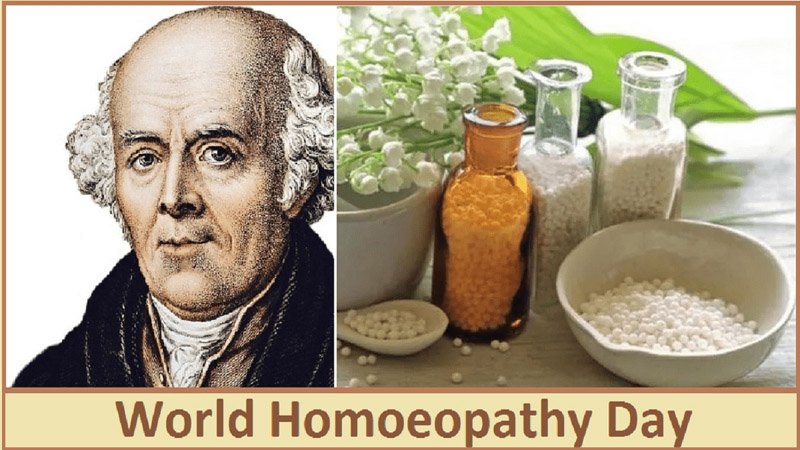Dr Satish Kumar Attri, Dr Neena Verma
Homoeopathy a holistic system of treatment based on unique approach of treatment with individual consideration as the most important part and as a new system of medicine was introduced to the suffering world by a renowned German Allopathic Physician Dr.Christian FriedrichSamuel Hahnemann MD, during the year1796.
World Homoeopathy day is observed as a remembrance and to pay tribute to him on April 10th and to commemorate the birthday of Dr.Samuel Hahnemann, the Founder of Homoeopathy every year across the globe. Dr Samuel Hahnemann was born in Meissen, a town in West Germany. Dr.Hahnemann cultivated the habit of original thinking since childhood. The poor condition of family even did not come in the way to his diligence and he because of his hard work and keen interest, completed MD degree from the most famous medical school in Leipzig, university of Erllangen Germany, in the year 1779. Dr Hahnemann was a linguist, possessing knowledge of a dozen of languages. His deep interest in chemistry, botany, literature, natural sciences, Philosophy, etc made him a reformer in health sector at that time. He was born when it was dark: Those were the days when some patients were treated with inhuman and cruel methods of bloodletting, application of Leeches on skin to suck impure blood, purgatives etc. Medical system had no direction, no scientific principles. He left his practice after dissatisfaction from the medical treatment ways of that time and then established this method of treatment after repeated experiments on himself and others.
Dr.SamuelHahnemann continued to experiment on himself and on others close to him, noting that every substance, he took produced definite distinct symptoms. He further noted that no two substances produced, exactly the same set of symptoms. Each substance provoked its own unique pattern of symptoms, both on physical and mental plane. At first, after cinchona bark decoction Dr.Hahnemann tested substances commonly used as medicines in his time (such as Antimony and Rhubarb) and also, poisons like Arsenic and Belladonna. The provings done by Hahnemann on himself and on others were recorded in his various writings from 1805 onwards. Eventually, Dr.Hahnemann began to treat the sick on the principles of Homoeopathy and achieved outstanding clinical success right from the outset.
Homoeopathy has been verified experimentally and clinically tested to be most effective. The scientific principles propounded by Dr.Hahnemann are natural and well proven and continue to be followed with success. Homeopathy is an effective and scientific system of healing which assists the natural tendency of the body/mind to heal itself. It recognizes that all symptoms of ill-health are expressions of disharmony within the whole person and that it is the patient who needs treatment not only the diseased organ. Ever since the homoeopathic medicine is being practiced worldwide, its popularity had soared in recent years due to its inherent virtues.
Integrating Homeopathy in Health Care:- Homoeopathy needs to be promoted not only as an alternative and complimentary but as a complete system and as first line of treatment. Homoeopathy is safe, gentle and effective in action. Sweet Homoeopathic pills and liquid dilutions are easy to take and even kids prefers to take it because of no bitterness and its safe for pregnant mothers also. Many Surgeries can be avoided using homoeopathic treatment. It’s the second most popular system of medicines worldwide.
World Homoeopathy Day: What it means for India
Homoeopathy is one of the most popular medical systems in India, in fact, a close second among the AYUSH (Ayurveda, Yoga and Naturopathy, Unani, Siddha and Homeopathy) services also. There are growing numbers of users, practitioners, educational institutes, as well as public health clinics, compared to the other AYUSH systems in India. Academic homeopathy institutes comprise nearly 35% of AYUSH colleges, while homeopathy practitioners are 37% of the AYUSH in total. India has the biggest drug manufacture and trade sector in Homoeopathy.
World Homoeopathy Day: What it means for J&K UT
Homoeopathy is being practiced by many people in J&K since 1940’s. In 2003 Government of erstwhile J&K State officially recognized Homoeopathy by passing the Homoeopathic practitioners Act in J&K legislative assembly. At present there are nearly 450 qualified but unemployed Homoeopathic doctors including many with MD degrees who need equal share in AYUSH/NHM recruitment policies. If separate Homoeopathic wing in every Hospital started than public will get benefited at large. Recruitment of Homoeopathic pharmacists along with Homoeopathic medical officers is also needed as they can focus more on the patient care and on research work. Like other states of country, early establishment of approved Homoeopathic Medical College & hospital will boost homoeopathy sector in J&KUT library and Research centers for doctors, Regular CME’s at Govt level for the Govt& Private practitioners areneeded for enhancing research studies on modern diseases & homoeopathicapproach as the public needs more skilled minds, Public awareness programs by way of free medical camps are very much needed.
For the first time in the history of J&K since its inception in 2003 World Homoeopathy Day is also being celebrated at government level by the Directorate of AYUSH and its a welcome step by the department and hailed by all the homoeopaths, we all thank the Department for this wonderful & supportive gesture. Government must introduce the department of Homoeopathy in all the upcoming medical projects/centers in J&K and also to open Homoeopathic Dispensaries in J&K as they have a low cost budget and are easy to establish in hilly areas also, where homoeopaths can provide their services to suffering Humanity. Promotion of Homoeopathy needs to be at large scale with the cooperation of Homoeopaths and the involvement is much needed, especially in our J&K. If Govt of J&K pays more attention to this system, definitely it can help to achieve the theme of this year: (Homoeopathy :SarvajanSwasthya “One health One family”)
Trending Now
E-Paper


